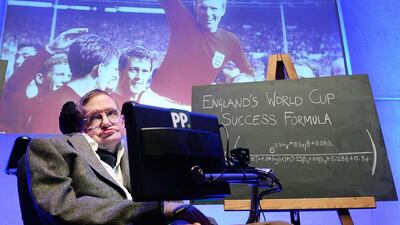Agence France-Presse
LONDON // The renown English physicist Stephen Hawking has looked at the data from every World Cup since 1966 and concluded the heat and humidity do not augur well for Roy Hodgson’s side.
The 72-year-old professor, who wrote the best-selling A Brief History of Time, believes England's prospects will improve if they have a European referee for their group match with Uruguay because northern hemisphere officials are less likely to be deceived by the on-field theatrics of the South American team's Liverpool striker, Luis Suarez.
For more 2014 World Cup, visit our dedicated microsite
Hawking also has devised the formula for a perfect penalty, with spot kicks long a problem for England at major tournaments, because “as we say in science, England couldn’t hit a cow’s arse with a banjo”.
He said England would be well advised to wearing their red kit, in which then won the 1966 World Cup, rather than their first-choice white.
“Statistically England’s red kit is more successful and we should play 4-3-3 rather than 4-4-2,” he said.
“Psychologists in Germany found red makes teams feel more confident and can lead them to being perceived as more aggressive and dominant. Likewise, 4-3-3 is more positive so the team benefits for similar psychological reasons.
"The data shows we also need to hope for a European referee. European referees are more sympathetic to the English game and less sympathetic to ballerinas like Suarez."
He said the impact of environmental factors is “quite staggering” for England’s team.
“Like all animals, the England team are creatures of habit. Being closer to home reduces the negative impact of cultural differences and jet lag. A 5°C rise in temperature reduces our chances of winning by 59 per cent. We are twice as likely to win when playing below 500 metres above sea level.”
As for penalties, Hawking, who was diagnosed with amyotrophic lateral sclerosis, a form of motor neuron disease, when he was 21, said “velocity is nothing without placement”.
“If only I had whispered this in Chris Waddle’s ear before he sent the ball into orbit in 1990,” he said of the World Cup semi-final shoot-out loss to West Germany in which Waddle was one of the England players who missed.
sports@thenational.ae

